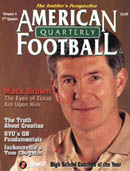AMERICAN FOOTBALL MONTHLY THE #1 RESOURCE FOR FOOTBALL COACHES
Article CategoriesAFM Magazine
|
The Eyes of Texas are Upon Brownby: Everett StarlingManaging Editor © More from this issue The youthful looking forty-something coach had told everyone who would listen he wasn't going anywhere. His team, the media, the fans. North Carolina had become home, and he was just dandy there, thank you. Kids in school. Roots. A wife with a lucrative land development business. Perhaps more compelling, Mack Brown had a top ten program two-years running, a program he had nutured from the brink of abandonment 10 years before. Those close to Brown, personally and professionally had seen the man champion through two 1-10 seasons and a divorce from his college sweetheart to work hard, building and earning the good things in life: a top-notch staff; a Tar Heel program kids didn't have to be pleaded into visiting anymore; a team that was growing an identity in the shadow of one of the nation's basketball dynasties; and yes, a....The full article can only be seen by subscribers.
|
|
|||||||
| HOME |
MAGAZINE |
SUBSCRIBE | ONLINE COLUMNISTS | COACHING VIDEOS |
Copyright 2025, AmericanFootballMonthly.com
All Rights Reserved





